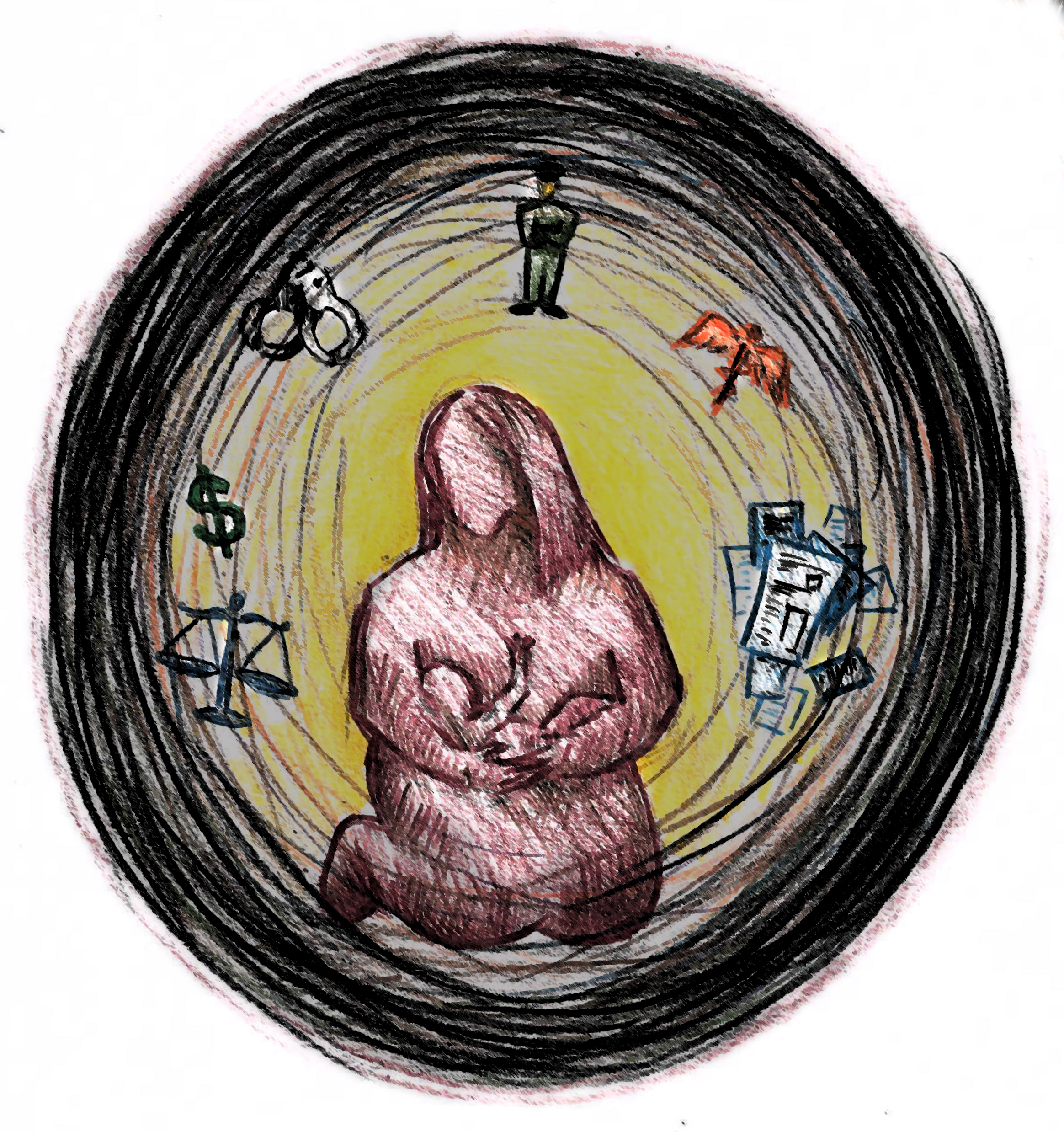Illustration by Gustavo Muniz
Johanna, 23, was eight months pregnant last spring when she began the 1,656-mile journey from Guatemala to Texas. From there, she planned to travel on to the Santa Clarita Valley to be reunited with her husband and her 3-year-old son who had come to the United States a few months before.
The couple had their own business in their native country, where they were victims of extortion. They believed it was safer for the family to be together with hopes of seeking asylum in a country that they felt had more opportunities for them.
Those hopes faded 15 minutes after Johanna crossed the Rio Grande, when an immigration vehicle pulled up in front of her. The pregnant woman spent the next couple of weeks in a detention center she described as “cold, crowded and full of fear.”
Johanna was briefly released to a nearby hospital to deliver her baby boy, then whisked back into the detention center with her newborn. The child was given just a blanket, no clothes. Johanna and her baby shared her frigid cell with men and women, including another new mother. When the babies would cry, the officers would scream at them to be quiet.
The next day, a delegation of what Johanna described as “important people” visited the detention center.
“One woman got close to the cell I was in and saw me with my baby without any clothes on and asked me how old he was. I told her, ‘One day,’” Johanna recalled. “The lady was shocked and asked me what I was doing with my day-old baby in a cold, unsanitary, and inappropriate space.”
Johanna’s answer: “‘I had no other choice.’”
The woman went to talk to an officer at the detention center. Johanna never saw her again. Later that day, Johanna was released and headed on a bus to California with her baby.
Johanna was reunited with her husband and 3-year-old son upon her arrival in the Santa Clarita Valley, where she took her baby to the Newhall Health Center for his first checkup. When she entered the doors to the clinic, Johanna and her son received a warm welcome — literally — from Project DULCE family specialist Karen Orellana.
“I only had two pieces of clothes for my baby and the day I came in, Karen asked me how she could help,” Johanna recalled. “I remember Karen giving me clothes and I was so happy at that moment that my baby had more clothes to keep warm.”
Johanna was immediately enrolled in Project DULCE, a program offered through the Northeast Valley Health Corporation and funded by First 5 LA in partnership with The Center for the Study of Social Policy.
Project DULCE is an innovative pediatric care-based intervention through which primary care clinical sites proactively address social determinants of health and promote the healthy development of infants from birth to 6 months of age.
With Orellana’s help, Johanna was referred to food banks and community resources where she was able to obtain food and clothes for her family, as well as health care coverage. Perhaps most importantly, though, Orellana lent Johanna her ear.
“When she shared her story, it was very emotional,” Orellana said. “I tried to let her share as much as she wanted to. It was a very, very touching story. To see her bravery and resilience is amazing.”
The family was also experiencing trauma from the threat of deportation. Both Johanna and her husband were facing deportation hearings in court.
Fortunately for Johanna and her family, each Project DULCE interdisciplinary team consists of a family specialist, a medical provider, a legal partner, an early childhood representative, a mental health representative, a project lead and a clinic administrator.
Through their efforts, Johanna was referred to behavioral health services along with her husband to discuss their traumatic experience. She also obtained a list of private attorneys who were willing to help Johanna and her family. Johanna was encouraged to find a job and succeeded. They even found community by joining a local church.
“Johanna had days where she wanted to return to her native country of Guatemala alongside her husband and children, but the support she received from Project DULCE and the clinic made her hopeful of the future,” Orellana said. “Project DULCE helps parents realize that all parents have strengths.”
“I could not even imagine where I would be without Project DULCE,” Johanna said. “If it was not for Karen I do not know where I would have sought help. She listened to me and I will never forget that. Her words of encouragement helped me stay strong for my family.”









